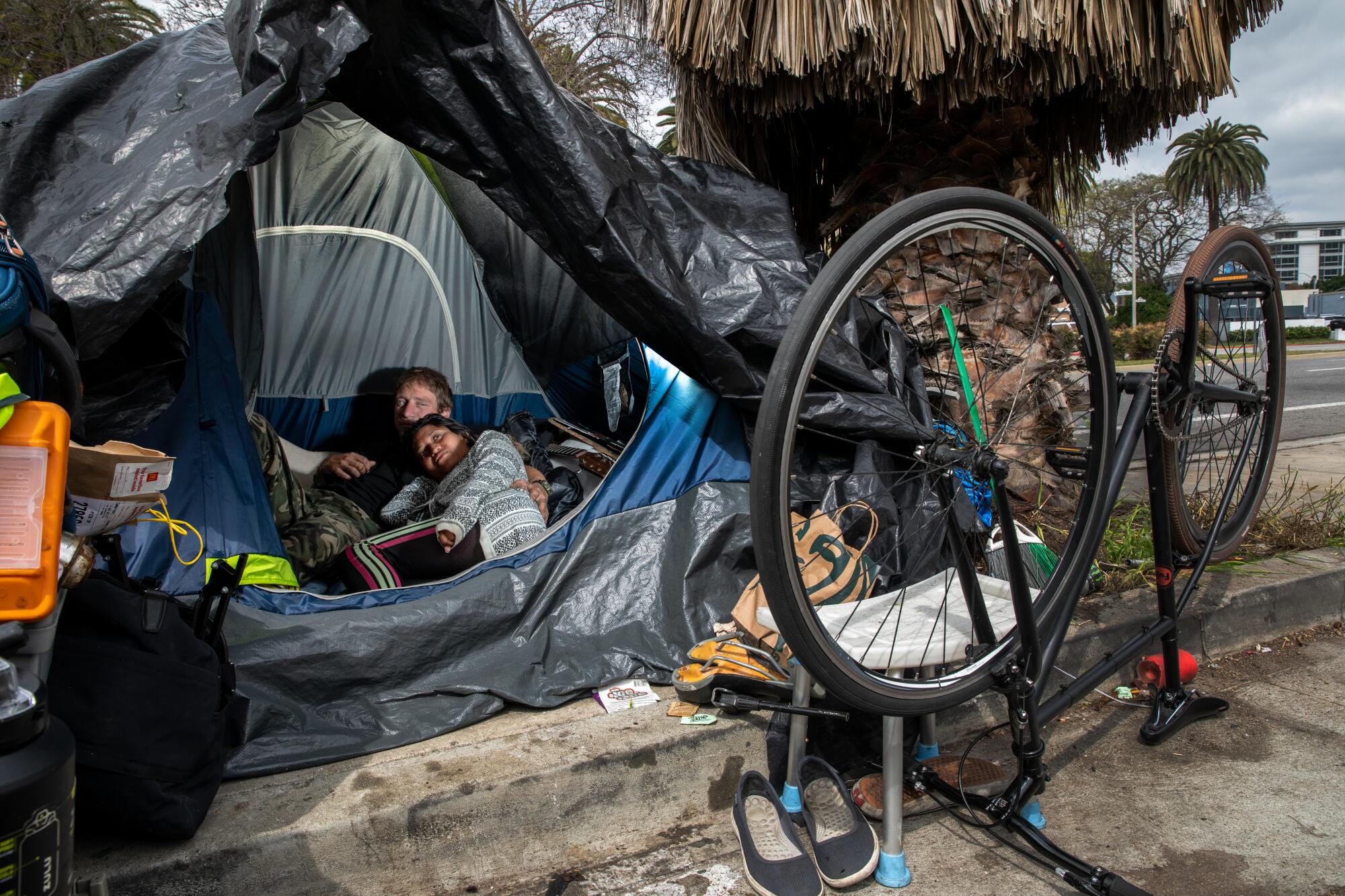
- Share via
For the first time in years, Steven Styne has a roof over his head.
The 52-year-old has been homeless on and off since 2014, when he lost his apartment in West Hollywood. During the pandemic he tried to find housing for his mother and himself, but those plans fell through.
Then, a driver crashed into the SUV he had been living in and totaled it. Styne knew some friends were staying along San Vicente Boulevard, near the Beverly Center and a luxury complex developed by former mayoral candidate Rick Caruso. Styne started sleeping there in February.
On Wednesday, Mayor Karen Bass went to L.A.’s Beverly Grove neighborhood to speak to residents of the San Vicente encampment — located across the street from Beverly Hills — and to monitor the latest operation of her Inside Safe initiative, which is designed to move unhoused people off the streets and into motel and hotel rooms.
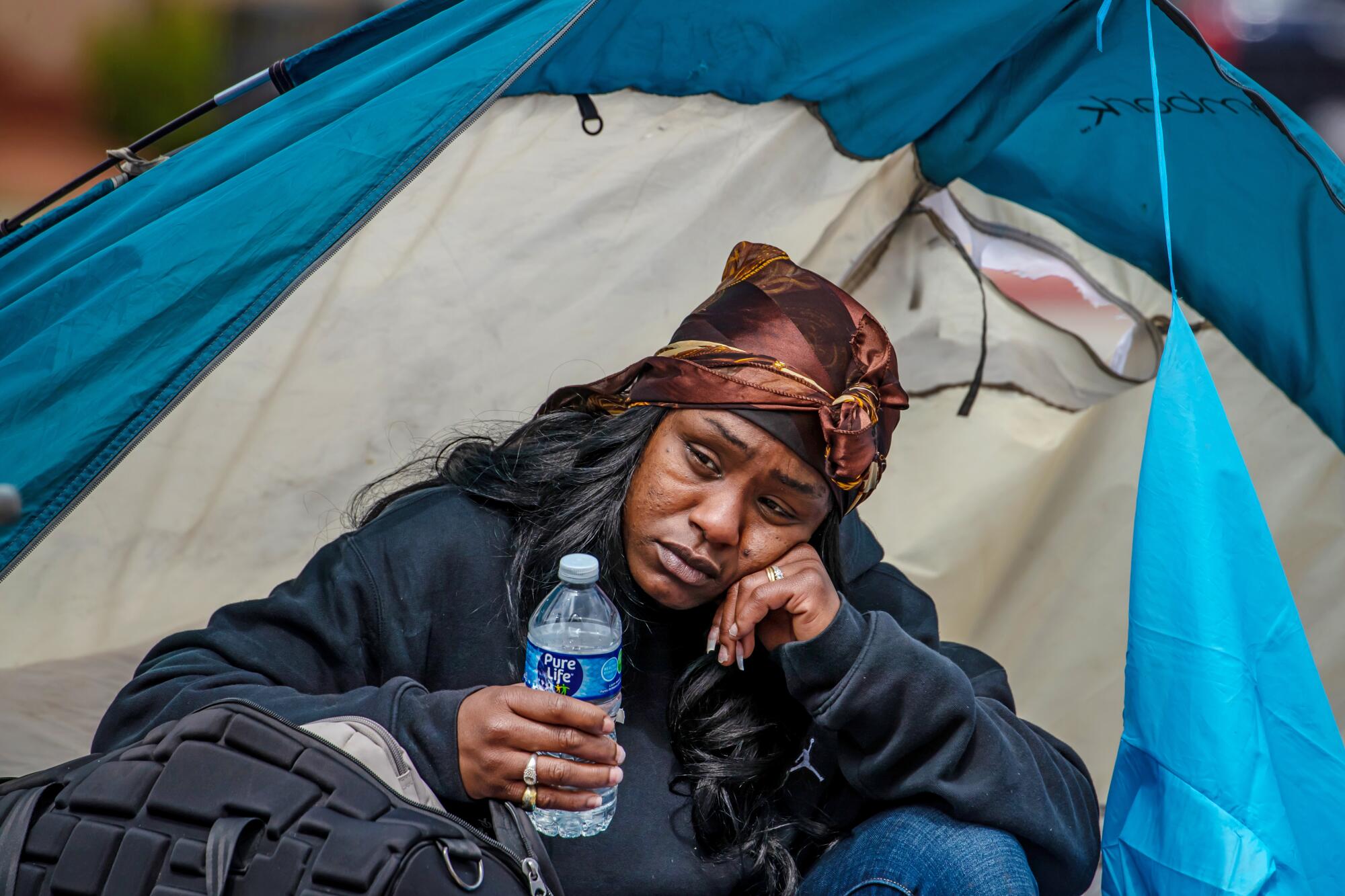
Styne accepted a spot at a motel room at 108th Street and Broadway. He already packed two small suitcases and two backpacks.
“I needed to get off the streets,” he said. “Even though it’s far away, I wanted to give it a shot. At least it’s a door to lock and a shower. I can sit and I can concentrate again. It’s hard to do that out here.”
Inside Safe is part of Bass’ effort to bring people indoors from their tents and to prevent the encampments from returning, according to a mayor’s office news release. The program has brought more than 1,200 people indoors since it was launched in December.
By Thursday afternoon, sanitation workers hosed off one side of San Vicente where a row of tents once sat. On a grassy median strip on the other side of the street, a cluster of about four tents remained.
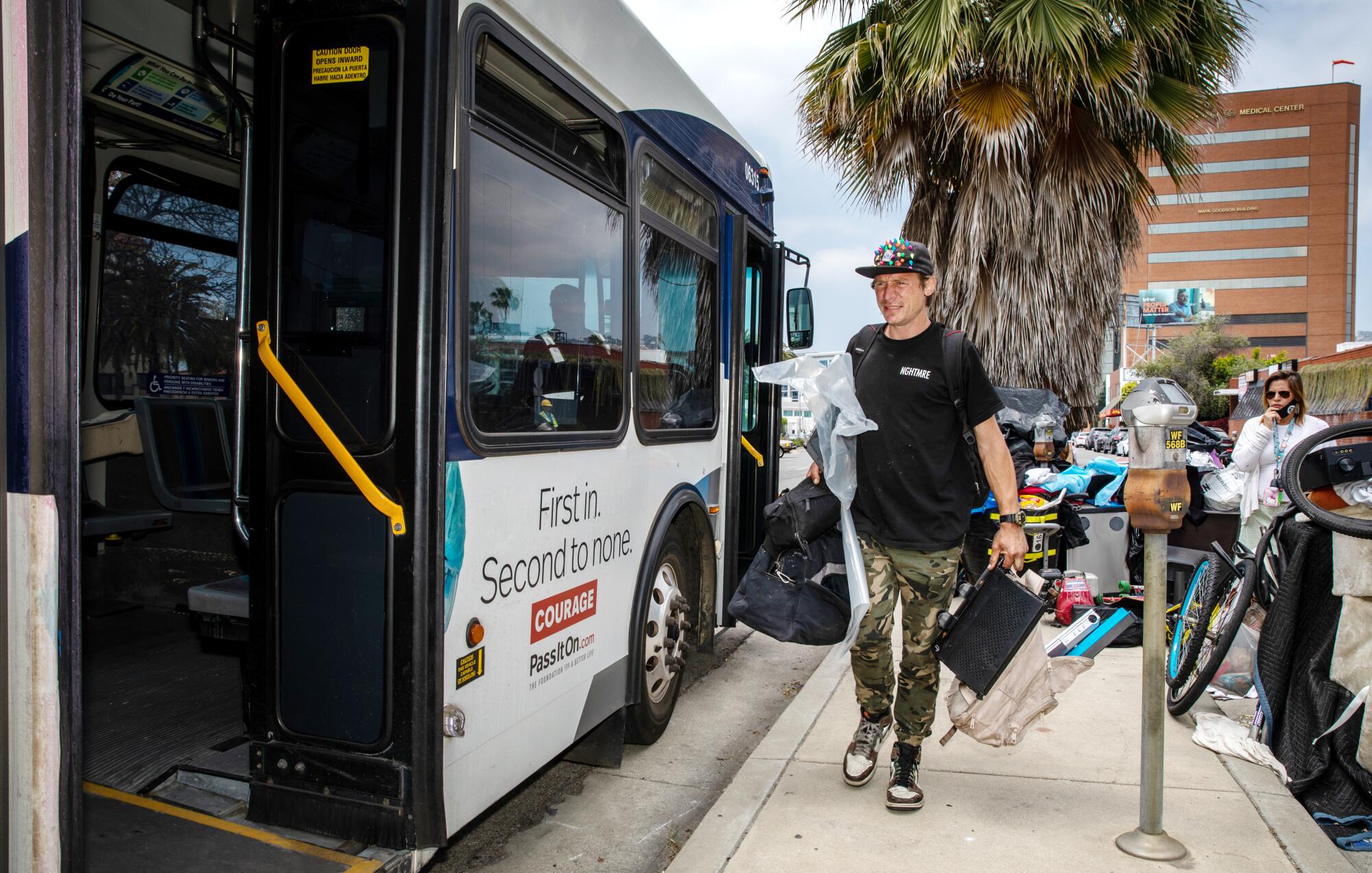
Relocating residents of the San Vicente encampment is the mayor’s 16th Inside Safe operation, and the second to be carried out in Councilmember Katy Yaroslavsky’s district, which includes a portion of the Westside.
Yaroslavsky acknowledged that all of the tents that made up the San Vicente encampment were on the Los Angeles side of the street. None were on the side that’s in the city of Beverly Hills.
Asked why that is, she said there is at least one reason: “We’re providing housing.”
“When you have disparities in terms of how cities are addressing a problem, you’re going to have people naturally moving to one side [of the street] — or being told to move to one side,” she added.
In a statement, Beverly Hills Mayor Julian A. Gold said all of the cities that make up the Westside are “doing their part to help those who are homeless.”
“For its part, the city of Beverly Hills spends hundreds of thousands of dollars providing services including shelter to those who need it, a responsibility we take very seriously,” he said.
San Vicente Boulevard was classified as a “challenging” encampment to both the people living in the tents and those who work and live nearby, according to Bass. It took her team months to find hotels that were affordable and would accept unhoused people.
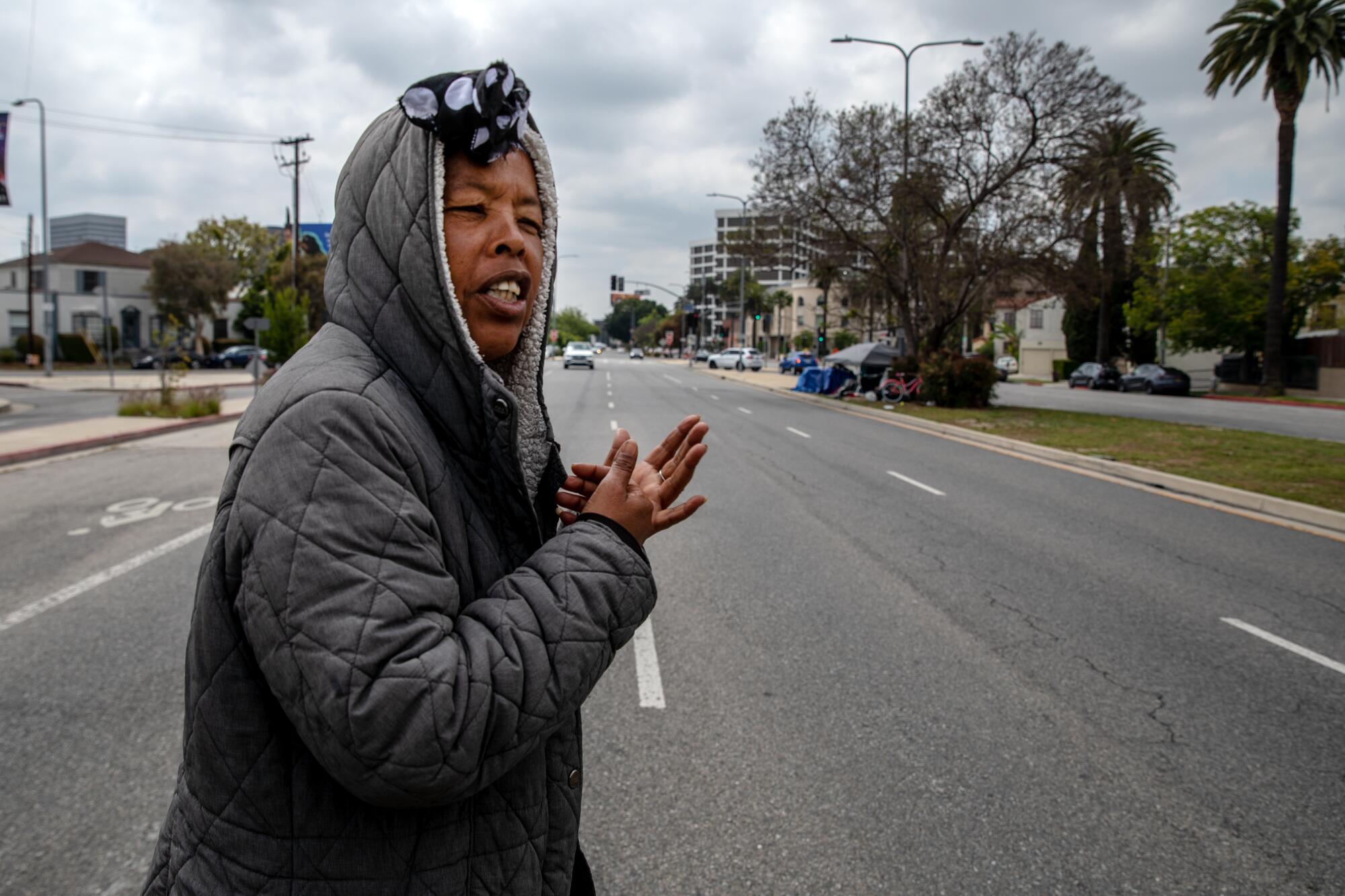
Some grassroots groups that provide aid to L.A.’s unhoused have been critical of Inside Safe, saying unhoused residents are not being provided sufficient social services — and at times meals — once they are moved into motel rooms. Those groups repeatedly criticized the city for moving homeless residents to locations that are far from the neighborhoods where they work or have social ties.
Bass acknowledged that the motels were far away from the camps, but stressed that her priority was getting them out of the tents.
“Our goal is to house people near where they were camping and we’re not always able to do that,” Bass said Thursday. “Given that this is an emergency, from my perspective, we don’t want to leave people on the street.”
Even after the tents were cleared out, residents and nearby business owners expressed worry that the encampment would return.
“They’re concerned about that, and I understand because they’ve seen tents come and go and they’ve seen the number of tents, especially over the last few weeks, increase because people were aware that we were going to be housing folks,” Bass said.
That would explain how at least 25 residents had been relocated from the San Vicente encampment as of Thursday, according to the mayor’s office, when fewer than 20 people were living there before Inside Safe.
Mima Adams, 55, who runs Mima’s Spiritual Shop on San Vicente Boulevard, said it started with one tent in June 2022 and grew to half a dozen more. Her business suffered for a year, she said, because people were afraid to come near the encampment.
“I don’t know how long they’re going to be able to keep them there,” she said. “I hope and pray it’s gonna be permanent housing for these people because it does break my heart to truly see them out there and the conditions they lived in as well.”
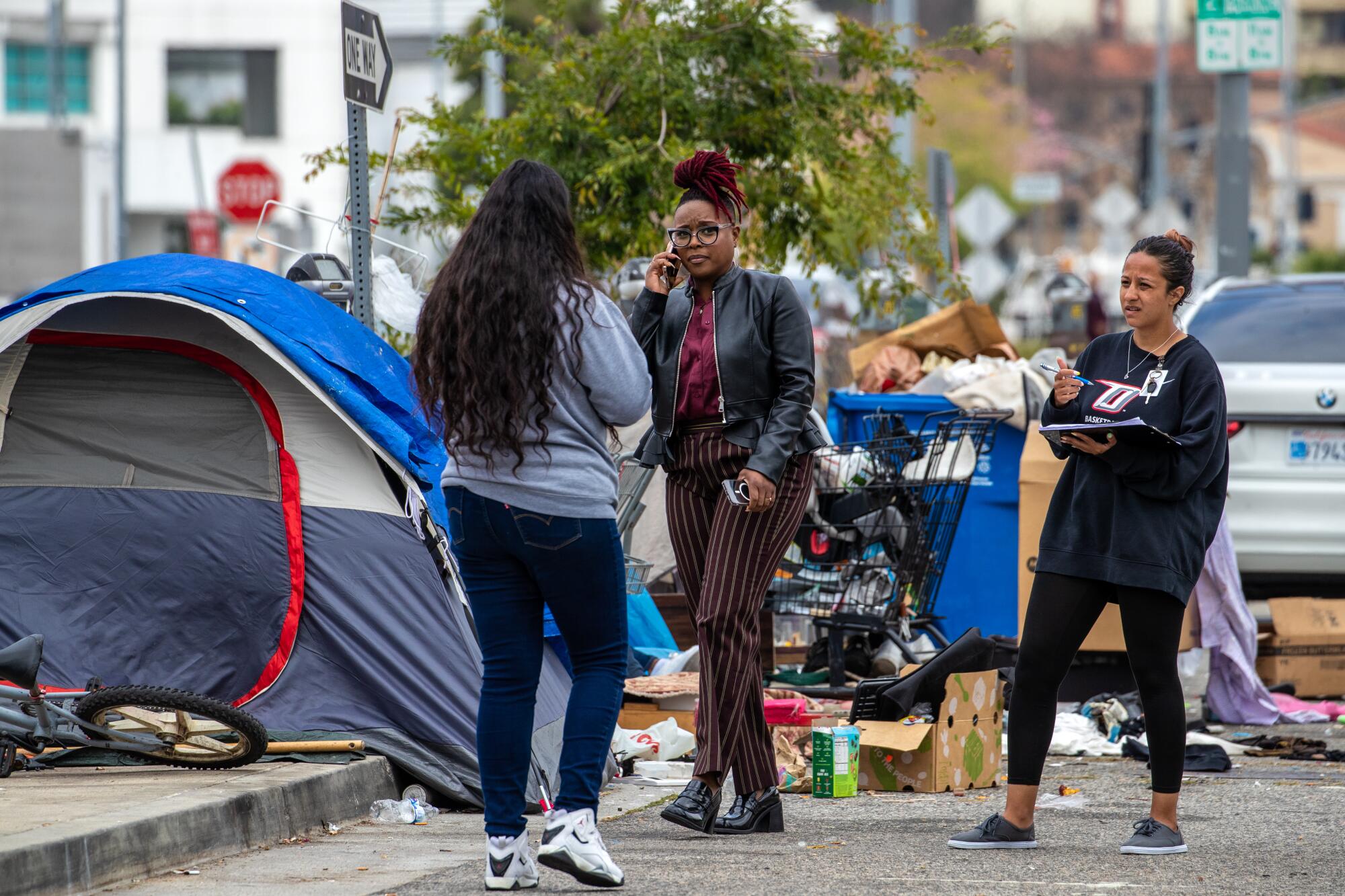
Styne returned to the encampment Thursday afternoon to watch over a friend’s tent and make sure none of his things were thrown out.
“It’s the stigma,” Styne said. “They’re saying we’re chasing the customers away. There’s some mental illness. Nobody’s harmed anybody. Nobody’s been in anybody’s way. The worst case is some messiness.”
Among the unhoused was James Boss, 30, who hauled his belongings onto a bus en route to a motel. Boss lived along San Vicente Boulevard since February. Before the bus drove off, he locked his bike and made plans to come back for it.
“I can’t get a job out here,” Boss said. “They don’t want to hire somebody who’s homeless, so that eliminates that barrier. I can finally create my own income and get myself into a better situation.”
Marie Carpenter, who has been living in the encampment for two years, said her youngest son was killed last year while they were living on San Vicente. The 57-year-old has tried staying in shelters and other housing in the past, but didn’t like being around people who use drugs.
Carpenter sat on the sidewalk and waited for her turn to get on the bus.
“I’m just tired,” she said. “I don’t want to be out here no more.”
More to Read
Sign up for Essential California
The most important California stories and recommendations in your inbox every morning.
You may occasionally receive promotional content from the Los Angeles Times.
















